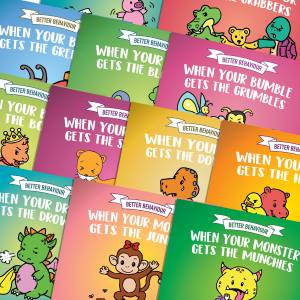When I was little, we didn’t mention words like depression or anxiety. We didn’t talk about learning disabilities or mental illness or substance abuse. Any questions kids had about those topics were met with “Shush!” and “Don’t ask about those things!” And honestly, I was little not THAT long ago.
Nevertheless, we’ve come a long way in the last two decades. Organisations like Bell encourage conversations about mental health, celebrities talk about their eating disorders, and schools offer better mental health services. And yet, so many adults still cringe when you mention those words. How can we teach kids to be open and seek help if we, the grownups, are still hesitant to talk about our struggles?
Maybe it’s because we tend to think that younger people don’t have the problems we have. But approximately 4.4 million American kids 3 to 17 have diagnosed anxiety, according to the CDC. One third of these also have depression, and another third have behavioural problems. Even more youths have ADHD (6.1 million!). So why aren’t we putting more effort into solutions and services?
The mental health conversation starts at home, and it starts with you, the adult. Overcoming your own stigmas and misconceptions is crucial to foster an environment of openness and acceptance in which your children will feel comfortable coming to you for help. If your daughter hears you say, “Oh lord, not another anorexic actress looking for attention,” she won’t come to you about her body image issues. If your son hears you laugh because “Real men don’t cry,” what are the odds he asks for help when he feels too depressed to get out of bed?
Here are three tips to approach mental health topics with your kids.
Be straightforward. Use proper terminology instead of saying things like “he has issues.” Give honest, direct information that’s appropriate for your children’s ages. While a 7 year old may have a lot of questions, a teenager probably needs a more in-depth conversation. Be careful how you speak—some terms aren’t acceptable anymore and only reinforce stigmas and shame.
Watch for reactions. After a lot of suicides, “I never noticed them suffering” is a constant refrain. We should all try to be more aware of people’s wellbeing, especially when discussing sensitive topics like mental health. Don’t brush off your teen’s “moodiness” as classic 16 year old behaviour without a second thought. During your conversations, check for confusion or fear and address any concerns. It’s normal to find these conversations difficult!
Offer support. Show your children you are there to listen, not just monologue. Especially with teenagers, the best conversations are dynamic, not one-sided. Without becoming too overbearing (asking if they’re okay constantly, obsessively checking up on them, etc.), let your kids know you will always make time for them and their struggles. Let them know you understand and you won’t get mad or make fun of them or judge them.
It’s normal to feel stress and sadness. Nobody is happy 100% of the time! But reaching out to friends and family for their sake and for yours is a crucial step in creating a world where mental illness isn’t synonymous with shame and weakness. You wouldn’t blame someone for having asthma, an illness of the lungs. Let’s work together to raise the next generation to stop blaming people for their illnesses of the brain.
For help tackling behavioural development topics, try Better Behaviour, a quirky self-help series perfect for kids 3 to 6.


